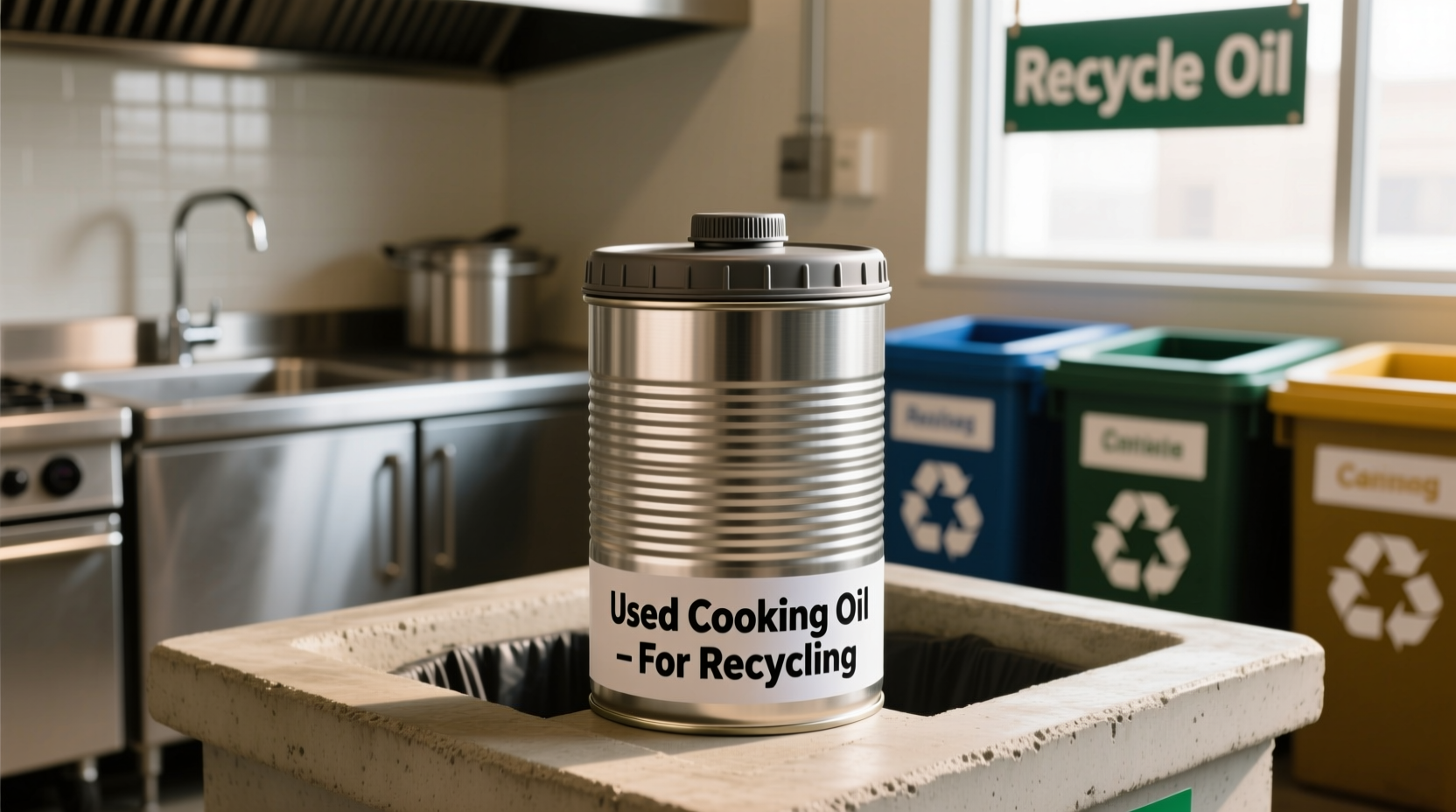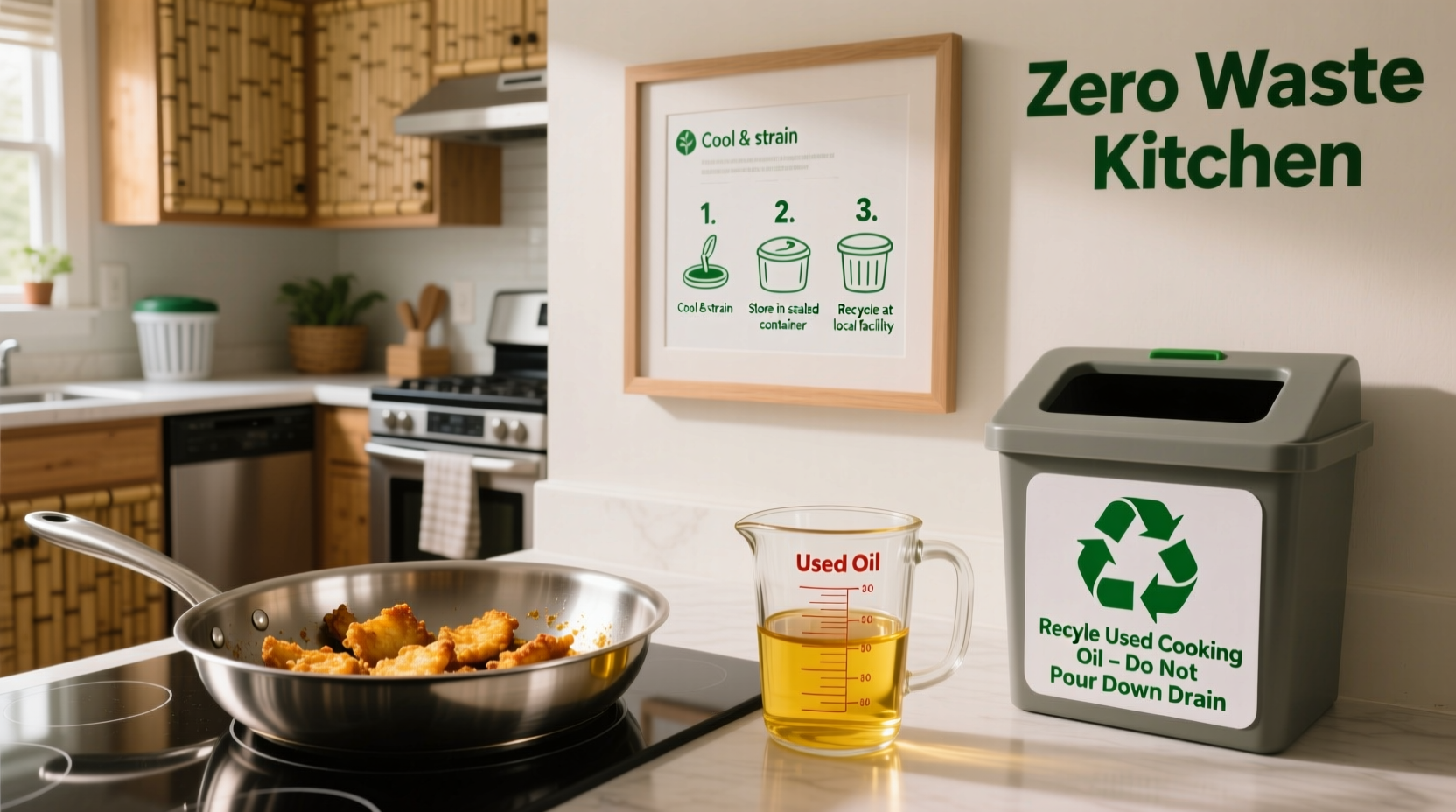Properly dispose of used cooking oil by cooling it completely, transferring to a sealed container, and taking it to a recycling center. Never pour it down drains—it clogs pipes and harms ecosystems. Recycling options include municipal collection programs, local restaurants, or biofuel facilities. For small amounts, solidify with absorbents like cat litter before trash disposal.
Why Your Used Cooking Oil Disposal Method Matters
Improper disposal of used cooking oil causes severe environmental damage and expensive plumbing issues. When poured down drains, just one liter of oil can contaminate one million liters of water according to the U.S. Environmental Protection Agency. Grease buildup in sewer systems costs U.S. municipalities over $1 billion annually in maintenance and repairs.
As a chef who's worked in both professional kitchens and home cooking environments, I've seen firsthand how small disposal mistakes create major problems. Let's explore practical solutions that protect your pipes, community, and planet.
Immediate Disposal: Step-by-Step for Home Cooks
Follow this sequence when you finish frying:
- Cool completely (minimum 2 hours at room temperature)
- Strain through cheesecloth to remove food particles
- Transfer to dedicated container (glass jar or original oil bottle)
- Seal tightly with leak-proof lid
- Label with date and oil type
| Container Type | Best For | Storage Duration |
|---|---|---|
| Glass jar with lid | All oil types | Up to 3 months |
| Plastic container | Short-term storage (1-2 weeks) | 1 month max |
| Freezer bag | Small quantities | 6 months frozen |
Finding Recycling Options Near You
Municipal recycling programs have expanded significantly since 2020. The Environmental Protection Agency reports that 85% of U.S. counties now offer cooking oil collection services, up from 62% in 2018. Here's how to locate options:
- Check your city's waste management website for "grease recycling" programs
- Use Earth911's oil recycling locator (updated monthly)
- Contact local biodiesel producers—they often accept donations
- Ask restaurants if they'll combine your oil with theirs for bulk recycling
Many communities offer curbside collection through special waste pickup days. In Portland, Oregon, the program has diverted over 2 million gallons of oil from landfills since 2019, converting it into renewable energy.

Creative Reuse Options Worth Considering
Before recycling, consider these practical reuse methods:
Homemade Soap Production
Used cooking oil can be transformed into soap through saponification. The process requires:
- 1 gallon cooled oil
- 5.7 ounces sodium hydroxide
- 12.3 ounces water
Note: Wear protective gear and follow precise measurements—improper ratios create dangerous lye-heavy soap.
Biofuel Conversion
Many community biodiesel workshops accept donations of clean, filtered oil. The conversion process involves:
- Dehydration (removing water content)
- Filtering (removing food particles)
- Transesterification (chemical process)
What Absolutely NOT to Do With Used Oil
Avoid these common mistakes that cause serious problems:
- Pouring down drains—Creates 'fatbergs' that block sewer systems
- Flushing with hot water—Temporarily dissolves oil but causes clogs downstream
- Putting in regular trash without solidifying—Leaks cause sanitation issues
- Reusing oil beyond recommended limits—Degrades quality and creates harmful compounds
The National Restaurant Association warns that reusing oil more than 2-3 times for deep frying creates acrylamide and other potentially harmful compounds. When oil becomes dark, foamy, or develops an off smell, it's time for proper disposal.
Special Considerations for Different Oil Types
Not all cooking oils behave the same during disposal:
- Animal fats (lard, tallow): Solidify at room temperature—store in freezer until collection day
- Corn/sunflower oil: Higher smoke point but degrades faster—limit reuse to 2 frying sessions
- Extra virgin olive oil: Best for single use due to low smoke point—recycle after first use
- Sesame oil: Strong flavor persists—better for recycling than reuse
Commercial kitchens follow strict guidelines under EPA Regulation 40 CFR Part 112, but home cooks can adopt similar principles for responsible disposal.











 浙公网安备
33010002000092号
浙公网安备
33010002000092号 浙B2-20120091-4
浙B2-20120091-4